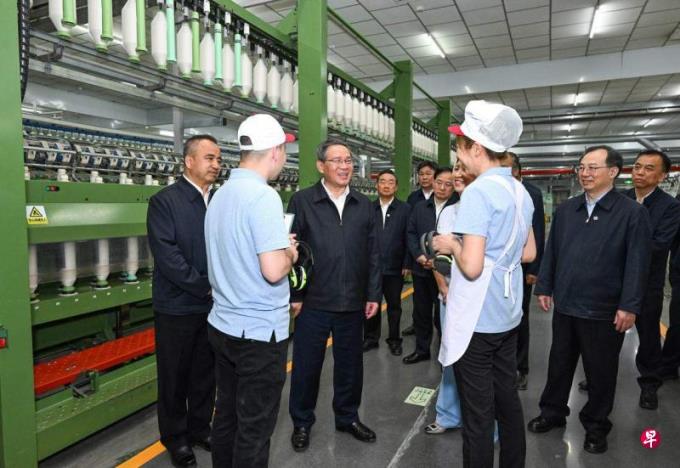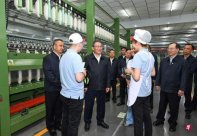
The United States has recently increased China to pressure China on the issue of forced labor in Xinjiang. Chinese Prime Minister Li Qiang went to Xinjiang for three days this week. During this period, Xinjiang asked Xinjiang to improve the level of opening up to the outside world, strengthen international exchanges, and build a bridgehead that opened west.Li Qiang also inspected the subsidiary of the old textile company of the US sanctions for four years.
The analysis of the scholars interviewed, Li Qiang inspected the textile companies sanctioned by the United States aiming to affirm and recognize the legitimacy of these operating companies in Xinjiang.The constant posture.
Li Qiang accompanied by Ma Xingrui, Secretary of the Party Committee of the Xinjiang Autonomous Region of the Communist Party of China, and other investigations in Xinjiang on Tuesday (May 7) to Thursday (9th).This is also the first time that Chinese officials held a symposium in Chongqing on April 23 and made new deployments for the development of western development. Li Qiang first inspected western China.
Li Qiang visited the capital Urumqi and the Changji Hui Autonomous Prefecture in the central and northern parts.
昌吉溢达是香港老牌纺织企业、中国最大The subsidiaries opened in Xinjiang, one of the shirt manufacturers, were included in the entity list of Uighurs for the Uighur forced labor prevention bill by the US Department of Commerce in mid -2020, leading to a large number of European and American customers.
China CCTV News Broadcasting on Thursday night shows that Yang Minde, chairman of the Yida Group, accompanied and explained to Li Qiang.Li Qiang said that he supports enterprises to increase investment in research and development, accelerate technological accumulation and iteration, and win the initiative in market competition.He demanded deepening cooperation in eastern, central and western China to better protect the security of national food, energy resources, and important industrial chain supply chain.
At the parliamentary hearing on April 30, officials of the US Department of Labor called on Congress hearing that international companies should not continue to operate in Xinjiang, and they said that the doubts of local forced labor were unsolved.Reuters quoted the Chinese Embassy in the United States on the same day that the allegations of forced labor "are just lies in the United States, trying to target Chinese companies."
The latest survey released by the US testing agency on Tuesday shows that the US ban on Xinjiang products seems invalid. At present, 19 % of the cotton products sold by US retailers and e -commerce platforms still have traces of Xinjiang cotton.
Yao Shujie, a professor of economics at Chongqing University, pointed out in an interview with Lianhe Morning Post that Li Qiang inspected the textile companies sanctioned by the United States to affirm and recognize the legitimacy of these companies in Xinjiang.Attach importance to the development of Xinjiang.
Since serving as the Premier of the State Council in March last year, Li Qiang has been in Beijing for investigation at least 14 times, and has visited 17 provinces and cities, including five western provinces and cities including Sichuan and Chongqing.Li Qiang's investigation in the local area is mostly one or two days. In August last year, in Guangdong, last October in Zhejiang, and this week's survey in Xinjiang for up to three days.
Li Qiang also requested Xinjiang to better link the countries along the "Silk Road Economic Belt" to the countries along the "Silk Road Economic Belt" this week to promote deepening economic and trade cooperation, enhance the function of the Sino -European trains, and create a good industrial ecology.
Yao Shujie analyzes that Xinjiang is an important export of the “Belt and Road” and the Central European trains, and it is also a large trade channel for China to export Central Asia, Eastern Europe and other places.During the Chinese official visit to Europe this week, it signed a number of agreements with Hungary in Eastern Europe, involving the fields of railway, highway, and automotive industry. It is expected to inject more benefits into Xinjiang's development.
Yao Shujie pointed out that Xinjiang has vast and has huge potential for agricultural development. As local wars around the world continue, China ’s overtaking development of Xinjiang is not only out of economic benefits, but also to ensure national strategic security such as food and energy.



